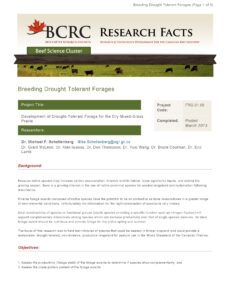Drought Tolerant Forage Mixtures
Remarque : cette page web n’est actuellement disponible qu’en anglais.
Because native species may increase carbon sequestration, improve wildlife habitat, lower agronomic inputs, and extend the grazing season, there is a growing interest in the use of native perennial species for seeded rangeland and reclamation following disturbance.
Diverse forage swards composed of native species have the potential to be as productive as tame monocultures in a greater range of environmental conditions. Unfortunately the information for the right combination of species is very limited.
A recently-completed research project funded by the National Check-off and Canada’s Beef Science Cluster tested mixtures of native warm and cool-season grasses, and legume species that could be seeded in former cropland and could provide a sustainable, drought tolerant, non-invasive, productive rangeland for pasture use in the Mixed Grassland of the Canadian Prairies.
The study found that forage yield and crude protein differed between the forage swards. Monocultures and combinations of the legumes and warm-season grasses ranked low (may be due to the exceptionally high precipitation during the study), while forage swards containing Western Wheatgrass ranked high.
Less productive species can have beneficial traits such as increasing nitrogen availability and drought resistance to the restored forage sward, carry little penalty under good growing conditions, and provide ‘insurance’ for less optimal years.
This research provided insight in forage sward development at the early establishment stage; additional work is required to determine species impacts for well-established forage swards.
To learn more about this research, view the BCRC fact sheet here:
- Drought Tolerant Forages (BCRC Fact Sheet)
Click here to subscribe to the BCRC Blog and receive email notifications when new content is posted.
The sharing or reprinting of BCRC Blog articles is welcome and encouraged. Please provide acknowledgement to the Beef Cattle Research Council, list the website address, www.BeefResearch.ca, and let us know you chose to share the article by emailing us at info@beefresearch.ca.
We welcome your questions, comments and suggestions. Contact us directly or generate public discussion by posting your thoughts below.
